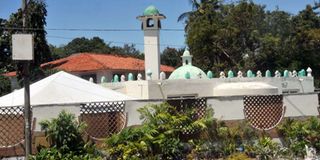
From left: Baktash Akasha, Ibrahim Akasha and Abdulsalam Akasha in court in January 2017.
| File | Nation Media GroupNews
Premium
New Mombasa family keen to dislodge Akasha empire from drugs trade
Authorities have stepped up surveillance of an apartment in the serene Nyali suburb of Mombasa believed to be owned by drug lords looking to take control of the narcotics business from the Akasha family.
With brothers Baktash and Ibrahim Akasha serving long jail terms in the United States following conviction on narcotics offences in 2018, Kenyan authorities say new players have emerged.
One after the other, immaculate apartments said to belong to some of the drug barons in the upmarket neighbourhood are shown to us by our source in the security circles, who explains that attention is, however, on the family reported to be seizing control of the drugs trade.
“That one belongs to a family that is operating under the guise of their known business, but, currently, they are the ones who are doing large shipments of narcotics,” said the source, as he pointed at the apartment of the family that police believe is slowly taking over from the Akashas.
The family, whose name we know, but cannot reveal as none has ever been taken to court despite arrests some two years ago, is known by its nickname, which is a household name in Mombasa.
The family moved from Kisauni, where it lived for a long time, to Nyali.
Intelligence reports obtained by Nation.Africa reveal that the family patriarch has been on the police radar, as are his two brothers.
“The families, which are currently on our radar, are the ones who are leading in the (drugs) business as we speak, but we cannot categorically say that they have taken over from the Akashas. The Akasha empire was internationally connected,” explained another police source from the Anti-Narcotics Unit.

Packets of heroin and cocaine recovered by anti-narcotic officers in Mombasa.
Under watch
Meanwhile, a suspect who is out of police custody on several court bonds following his arrests in connection with the illicit trade, and his relative who has served a jail term over the same, are also under police watch.
Police are also monitoring another suspect who operates in the South Coast.
Last year, Coast Regional Commissioner John Elungata claimed the suspect had operated with impunity at the South Coast because he had paid some police officers to protect him and his business.
During his arrest last year, the suspect was with a police officer who was also arrested.
The thriving of drug cartels at the Coast has in the past been blamed on corruption in the police force, which for years shielded the drug barons from investigation and prosecution.
During the trial of the Akasha brothers, a US court was told they bribed Kenyan officials to escape justice and protect their drug empire.
“When the brothers encountered legal interference, they bribed Kenyan officials — including judges, prosecutors, and law enforcement officers — in an effort to avoid facing the charges against them in the United States,” Manhattan US Attorney Geoffrey S Berman said upon their convictions in October 2018.
“Baktash Akasha Abdalla and his brother, Ibrahim Akasha Abdalla, were the leader and deputy of a sophisticated international drug trafficking network, responsible for tonnes of narcotics shipments throughout the world. Not only did they manufacture and distribute narcotics for over two decades, they kidnapped, beat, and murdered others who posed a threat to their enterprise,” Mr Berman was quoted in a statement released by the Department of Justice, US Attorney’s Office, Southern District of New York.

Lawyer Cliff Ombeta (right) with his clients Vijaygiri Anandgiri Goswami, Gulam Hussein and Ibrahim Akasha during the mention of their extradition proceedings at the Mombasa Law Courts back in January 13, 2017.
Baktash and Ibrahim had been arrested in Kenya on November 9, 2014, after providing 99 kilogrammes of heroin and two kilogrammes of methamphetamine to a US Drug Enforcement Administration (DEA) agent who had posed as a buyer.
Their bribery scheme to scuttle their extradition to America was thwarted on January 29, 2017, when the two brothers were seized from Kenya and spirited away by DEA agents to the US for prosecution.
The fight against drug traffickers at the Coast is set to be bolstered should the Narcotics, Drugs and Psychotropic Substances (Control) Amendment Bill, 2020, which proposes stiffer penalties for drug barons, be passed.

The home of former drug baron the late Ibrahim Akasha in Nyali in this picture taken on September 22, 2020.
Hefty fines
The Bill, which is before the National Assembly committee on Administration and National Security seeks to fine drug traffickers up to Sh100 million when found to be in possession of chemicals used to make narcotics.
The penalties will be given to any person who traffics in, or has in their possession, any narcotic drugs or psychotropic substance or any substance represented or held out by him or her to be a narcotic drug or psychotropic substance, according to the new proposals.
A person who is outside Kenya and conspires with another person who is in the country will be liable to a conviction and a fine of not less than Sh100 million and life imprisonment, it proposes. The person will be deemed to have committed the offence in Kenya.
“Where the person is in possession of 101 grammes or more, to a fine of not less than Sh50 million or three times the market value of narcotic drug or psychotropic substance and imprisonment for life,” reads the Bill.
According to the current law, a drug trafficker can be fined Sh1 million, or three times the market value of the drug or whichever is greater, in addition to life imprisonment.
The new proposal further states a person found in possession of 1-5 grammes is liable to a fine of not less than Sh20 million and imprisonment for life.
The proposed law, which has the support of President Uhuru Kenyatta, will also see a law enforcement officer who aids or abets any offence, including concealing the commission of the offence or colluding with any person suspected of committing the offence, liable upon conviction to a fine of not less than Sh20 million or imprisonment for a term not less than 20 years, or both.
Reports indicate that the Bill is what law enforcers are pushing to help them scuttle efforts by those angling to take over the drugs business in the country.
With the plans on course, the Nation has learnt that an intelligence unit is working to complete its profiling of drug dealers at the Coast.
“The new law is expected to be passed by next year, and if it goes well, then it will be chaotic down here. We have the support that we need and we are hopeful that Parliament will not fail us,” a senior security official said.
Some leaders from the Coast have welcomed the proposed law since the region has borne the brunt of the illegal drugs trade, which has wasted the lives of many youths.
Lenient laws, failure to enforce them and collusion were blamed for the mafia-style operation by the Akashas who built a multi-billion-shilling family empire from the illegal trade.





